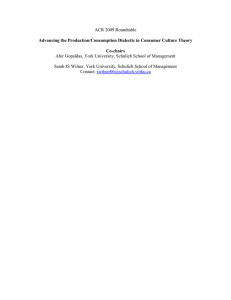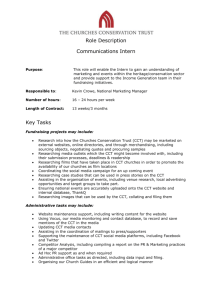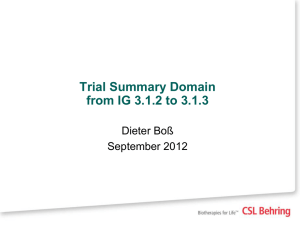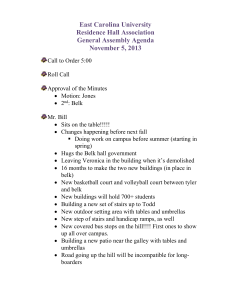CONSUMER CULTURE THEORY: CONSTITUTION AND
advertisement
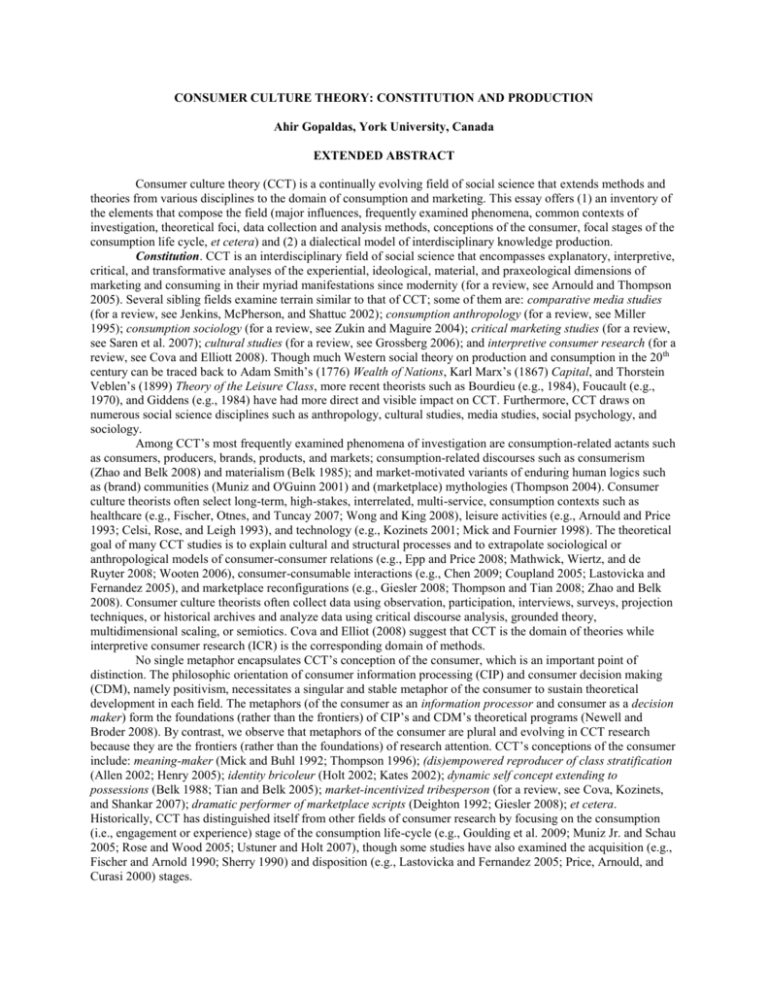
CONSUMER CULTURE THEORY: CONSTITUTION AND PRODUCTION Ahir Gopaldas, York University, Canada EXTENDED ABSTRACT Consumer culture theory (CCT) is a continually evolving field of social science that extends methods and theories from various disciplines to the domain of consumption and marketing. This essay offers (1) an inventory of the elements that compose the field (major influences, frequently examined phenomena, common contexts of investigation, theoretical foci, data collection and analysis methods, conceptions of the consumer, focal stages of the consumption life cycle, et cetera) and (2) a dialectical model of interdisciplinary knowledge production. Constitution. CCT is an interdisciplinary field of social science that encompasses explanatory, interpretive, critical, and transformative analyses of the experiential, ideological, material, and praxeological dimensions of marketing and consuming in their myriad manifestations since modernity (for a review, see Arnould and Thompson 2005). Several sibling fields examine terrain similar to that of CCT; some of them are: comparative media studies (for a review, see Jenkins, McPherson, and Shattuc 2002); consumption anthropology (for a review, see Miller 1995); consumption sociology (for a review, see Zukin and Maguire 2004); critical marketing studies (for a review, see Saren et al. 2007); cultural studies (for a review, see Grossberg 2006); and interpretive consumer research (for a review, see Cova and Elliott 2008). Though much Western social theory on production and consumption in the 20 th century can be traced back to Adam Smith’s (1776) Wealth of Nations, Karl Marx’s (1867) Capital, and Thorstein Veblen’s (1899) Theory of the Leisure Class, more recent theorists such as Bourdieu (e.g., 1984), Foucault (e.g., 1970), and Giddens (e.g., 1984) have had more direct and visible impact on CCT. Furthermore, CCT draws on numerous social science disciplines such as anthropology, cultural studies, media studies, social psychology, and sociology. Among CCT’s most frequently examined phenomena of investigation are consumption-related actants such as consumers, producers, brands, products, and markets; consumption-related discourses such as consumerism (Zhao and Belk 2008) and materialism (Belk 1985); and market-motivated variants of enduring human logics such as (brand) communities (Muniz and O'Guinn 2001) and (marketplace) mythologies (Thompson 2004). Consumer culture theorists often select long-term, high-stakes, interrelated, multi-service, consumption contexts such as healthcare (e.g., Fischer, Otnes, and Tuncay 2007; Wong and King 2008), leisure activities (e.g., Arnould and Price 1993; Celsi, Rose, and Leigh 1993), and technology (e.g., Kozinets 2001; Mick and Fournier 1998). The theoretical goal of many CCT studies is to explain cultural and structural processes and to extrapolate sociological or anthropological models of consumer-consumer relations (e.g., Epp and Price 2008; Mathwick, Wiertz, and de Ruyter 2008; Wooten 2006), consumer-consumable interactions (e.g., Chen 2009; Coupland 2005; Lastovicka and Fernandez 2005), and marketplace reconfigurations (e.g., Giesler 2008; Thompson and Tian 2008; Zhao and Belk 2008). Consumer culture theorists often collect data using observation, participation, interviews, surveys, projection techniques, or historical archives and analyze data using critical discourse analysis, grounded theory, multidimensional scaling, or semiotics. Cova and Elliot (2008) suggest that CCT is the domain of theories while interpretive consumer research (ICR) is the corresponding domain of methods. No single metaphor encapsulates CCT’s conception of the consumer, which is an important point of distinction. The philosophic orientation of consumer information processing (CIP) and consumer decision making (CDM), namely positivism, necessitates a singular and stable metaphor of the consumer to sustain theoretical development in each field. The metaphors (of the consumer as an information processor and consumer as a decision maker) form the foundations (rather than the frontiers) of CIP’s and CDM’s theoretical programs (Newell and Broder 2008). By contrast, we observe that metaphors of the consumer are plural and evolving in CCT research because they are the frontiers (rather than the foundations) of research attention. CCT’s conceptions of the consumer include: meaning-maker (Mick and Buhl 1992; Thompson 1996); (dis)empowered reproducer of class stratification (Allen 2002; Henry 2005); identity bricoleur (Holt 2002; Kates 2002); dynamic self concept extending to possessions (Belk 1988; Tian and Belk 2005); market-incentivized tribesperson (for a review, see Cova, Kozinets, and Shankar 2007); dramatic performer of marketplace scripts (Deighton 1992; Giesler 2008); et cetera. Historically, CCT has distinguished itself from other fields of consumer research by focusing on the consumption (i.e., engagement or experience) stage of the consumption life-cycle (e.g., Goulding et al. 2009; Muniz Jr. and Schau 2005; Rose and Wood 2005; Ustuner and Holt 2007), though some studies have also examined the acquisition (e.g., Fischer and Arnold 1990; Sherry 1990) and disposition (e.g., Lastovicka and Fernandez 2005; Price, Arnould, and Curasi 2000) stages. Production. Arguably, one of the most important transdisciplinary questions in the social sciences is: how does science progress (Feyerabend 1975: anything goes; Kuhn 1962: paradigm shifts/scientific revolutions)? Or more broadly, how does knowledge evolve (Foucault 1970, 1972)? Over the course of the 20th century, these questions provoked numerous debates. While these debates continue among philosophers of science, academic fields often have their preferred philosophic approach to knowledge production. Denzin and Lincoln (2005) have proposed bricolage as a metaphor for interdisciplinary knowledge production in the social sciences. For them, bricolage is the mixing and matching of ontologics, epistemologics, methodologics, axiologics, and theories from multiple disciplines to solve the research problems at hand. Adapting Denzin and Lincoln’s metaphor of bricolage, we supplement Kuhn and Feyerabend’s canonic models of scientific progress with a recognition that paradigmatic pluralism in an interdisciplinary field of social science, such as CCT, can foster a pair of contrasting ideologies that we term intellectual bureaucracy and bricolage. The ideology of bureaucracy favors tradition, conformity, and essentiality, thrives in authoritarian environs, and permits incremental intra-disciplinary research developments, but hinders breakthrough and inter-disciplinary progress. By contrast, the ideology of bricolage favors novelty, multiplicity, and hybridity, thrives in anarchic environs, and encourages the forging of new theoretical linkages across disciplinary divides, but disregards the origins of ideas and the situated intentions of their creators. Within this dialectical model, exemplary interdisciplinary research is conceived of as reasoned ideological compromise between bureaucracy and bricolage. REFERENCES Allen, Douglas E. (2002), "Toward a Theory of Consumer Choice as Sociohistorically Shaped Practical Experience: The Fits-Like-a-Glove (Flag) Framework," Journal of Consumer Research, 28 (4), 515-32. Arnould, Eric J. and Linda L. Price (1993), "River Magic: Extraordinary Experience and the Extended Service Encounter," Journal of Consumer Research, 20 (1), 24. Arnould, Eric J. and Craig J. Thompson (2005), "Consumer Culture Theory (CCT): Twenty Years of Research," Journal of Consumer Research, 31 (4), 868-82. Belk, Russell W. (1985), "Materialism: Trait Aspects of Living in the Material World," Journal of Consumer Research, 12 (3), 265. --- (1988), "Possessions and the Extended Self," Journal of Consumer Research, 15 (2), 139. Bourdieu, Pierre (1984), Distinction: A Social Critique of the Judgement of Taste, Cambridge, Mass.: Harvard University Press. Celsi, Richard L., Randall L. Rose, and Thomas W. Leigh (1993), "An Exploration of High-Risk Leisure Consumption through Skydiving," Journal of Consumer Research, 20 (1), 1. Chen, Yu (2009), "Possession and Access: Consumer Desires and Value Perceptions Regarding Contemporary Art Collection and Exhibit Visits," Journal of Consumer Research, 35 (6), 925-40. Coupland, Jennifer Chang (2005), "Invisible Brands: An Ethnography of Households and the Brands in Their Kitchen Pantries," Journal of Consumer Research, 32 (1), 106-18. Cova, Bernard and Richard Elliott (2008), "Everything You Always Wanted to Know About Interpretive Consumer Research but Were Afraid to Ask," Qualitative Market Research: An International Journal, 11 (2), 121-29. Cova, Bernard, Robert Kozinets, and Avi Shankar (2007), Consumer Tribes, Oxford, UK: Elsevier. Deighton, John (1992), "The Consumption of Performance," Journal of Consumer Research, 19 (3), 362. Denzin, Norman K. and Yvonna S. Lincoln (2005), The Sage Handbook of Qualitative Research, Thousand Oaks, CA: Sage Publications. Epp, Amber M. and Linda L. Price (2008), "Family Identity: A Framework of Identity Interplay in Consumption Practices," Journal of Consumer Research, 35 (1), 50-70. Feyerabend, Paul K. (1975), Against Method: Outline of an Anarchistic Theory of Knowledge, London: NLB. Fischer, Eileen and Stephen J. Arnold (1990), "More Than a Labor of Love: Gender Roles and Christmas Gift Shopping," Journal of Consumer Research, 17 (3), 333. Fischer, Eileen, Cele C. Otnes, and Linda Tuncay (2007), "Pursuing Parenthood: Integrating Cultural and Cognitive Perspectives on Persistent Goal Striving," Journal of Consumer Research, 34 (4), 425-40. Foucault, Michel (1970), The Order of Things: An Archaeology of the Human Sciences, London: Tavistock Publications. --- (1972), The Archaeology of Knowledge, London: Tavistock Publications. Giddens, Anthony (1984), The Constitution of Society: Outline of the Theory of Structuration, Cambridge, UK: Polity Press. Giesler, Markus (2008), "Conflict and Compromise: Drama in Marketplace Evolution," Journal of Consumer Research, 34 (6), 739-53. Goulding, Christina, Avi Shankar, Richard Elliott, and Robin Canniford (2009), "The Marketplace Management of Illicit Pleasure," Journal of Consumer Research, 35 (5), 759-71. Grossberg, Larry (2006), "Does Cultural Studies Have Futures? Should It? (or What's the Matter with New York?): Cultural Studies, Contexts, and Conjunctures," Cultural Studies, 20 (1), 1-32. Henry, Paul C. (2005), "Social Class, Market Situation, and Consumers' Metaphors of (Dis)Empowerment," Journal of Consumer Research, 31 (4), 766-78. Holt, Douglas B. (2002), "Why Do Brands Cause Trouble? A Dialectical Theory of Consumer Culture and Branding," Journal of Consumer Research, 29 (1), 70-90. Jenkins, Henry, Tara McPherson, and Jane Shattuc (2002), "The Culture That Sticks to Your Skin: A Manifesto for a New Cultural Studies," in Hop on Pop: The Politics and Pleasures of Popular Culture, Durham, NC: Duke University Press, 3-25. Kates, Steven M. (2002), "The Protean Quality of Subcultural Consumption: An Ethnographic Account of Gay Consumers," Journal of Consumer Research, 29 (3), 383-99. Kozinets, Robert V. (2001), "Utopian Enterprise: Articulating the Meanings of Star Trek's Culture of Consumption," Journal of Consumer Research, 28 (1), 67-88. Kuhn, Thomas S. (1962), The Structure of Scientific Revolutions, Chicago: University of Chicago Press. Lastovicka, John L. and Karen V. Fernandez (2005), "Three Paths to Disposition: The Movement of Meaningful Possessions to Strangers," Journal of Consumer Research, 31 (4), 813-23. Marx, Karl ([1867] 1970), Capital: A Critique of Political Economy, Vols. 1-3, London, UK: Lawrence and Wishart. Mathwick, Charla, Caroline Wiertz, and Ko de Ruyter (2008), "Social Capital Production in a Virtual P3 Community," Journal of Consumer Research, 34 (6), 832-49. Mick, David Glen and Claus Buhl (1992), "A Meaning-Based Model of Advertising Experiences," Journal of Consumer Research, 19 (3), 317. Mick, David Glen and Susan Fournier (1998), "Paradoxes of Technology: Consumer Cognizance, Emotions, and Coping Strategies," Journal of Consumer Research, 25 (2), 123-43. Miller, Daniel (1995), "Consumption and Commodities," Annual Review of Anthropology, 24, 141-61. Muniz Jr., Albert M. and Thomas C. O'Guinn (2001), "Brand Community," Journal of Consumer Research, 27 (4), 412-32. Muniz Jr., Albert M. and Hope Jensen Schau (2005), "Religiosity in the Abandoned Apple Newton Brand Community," Journal of Consumer Research, 31 (4), 737-47. Newell, Ben R. and Arndt Broder (2008), "Cognitive Processes, Models and Metaphors in Decision Research," Judgment and Decision Making, 3 (3), 195-204. Price, Linda L., Eric J. Arnould, and Carolyn Folkman Curasi (2000), "Older Consumers' Disposition of Special Possessions," Journal of Consumer Research, 27 (2), 179-201. Rose, Randall L. and Stacy L. Wood (2005), "Paradox and the Consumption of Authenticity through Reality Television," Journal of Consumer Research, 32 (2), 284-96. Saren, Mike, Pauline MacLaran, Christina Goulding, Richard Elliott, Avi Shankar, and Miriam Catterall (2007), Critical Marketing: Designing the Field, Oxford: Butterworth-Heinemann. Sherry Jr., John F. (1990), "A Sociocultural Analysis of a Midwestern American Flea Market," Journal of Consumer Research, 17 (1), 13. Smith, Adam ([1776] 1985), An Inquiry into the Nature and Causes of the Wealth of Nations, New York, NY: Modern Library. Thompson, Craig J. (1996), "Caring Consumers: Gendered Consumption Meanings and the Juggling Lifestyle," Journal of Consumer Research, 22 (4), 388. --- (2004), "Marketplace Mythology and Discourses of Power," Journal of Consumer Research, 31 (1), 162-80. Thompson, Craig and Kelly Tian (2008), "Reconstructing the South: How Commercial Myths Compete for Identity Value through the Ideological Shaping of Popular Memories and Countermemories," Journal of Consumer Research, 34 (5), 595-613. Tian, Kelly and Russell W. Belk (2005), "Extended Self and Possessions in the Workplace," Journal of Consumer Research, 32 (2), 297-310. Ustuner, Tuba and Douglas B. Holt (2007), "Dominated Consumer Acculturation: The Social Construction of Poor Migrant Women's Consumer Identity Projects in a Turkish Squatter," Journal of Consumer Research, 34 (1), 41-56. Veblen, Thorstein Bunde ([1899] 1970), The Theory of the Leisure Class, London, UK: Unwin. Wong, Nancy and Tracey King (2008), "The Cultural Construction of Risk Understandings through Illness Narratives," Journal of Consumer Research, 34 (5), 579-94. Wooten, David B. (2006), "From Labeling Possessions to Possessing Labels: Ridicule and Socialization among Adolescents," Journal of Consumer Research, 33 (2), 188-98. Zhao, Xin and Russell W. Belk (2008), "Politicizing Consumer Culture: Advertising's Appropriation of Political Ideology in China's Social Transition," Journal of Consumer Research, 35 (2), 231-44. Zukin, Sharon and Jennifer Smith Maguire (2004), "Consumers and Consumption," Annual Review of Sociology, 30, 173-97.

